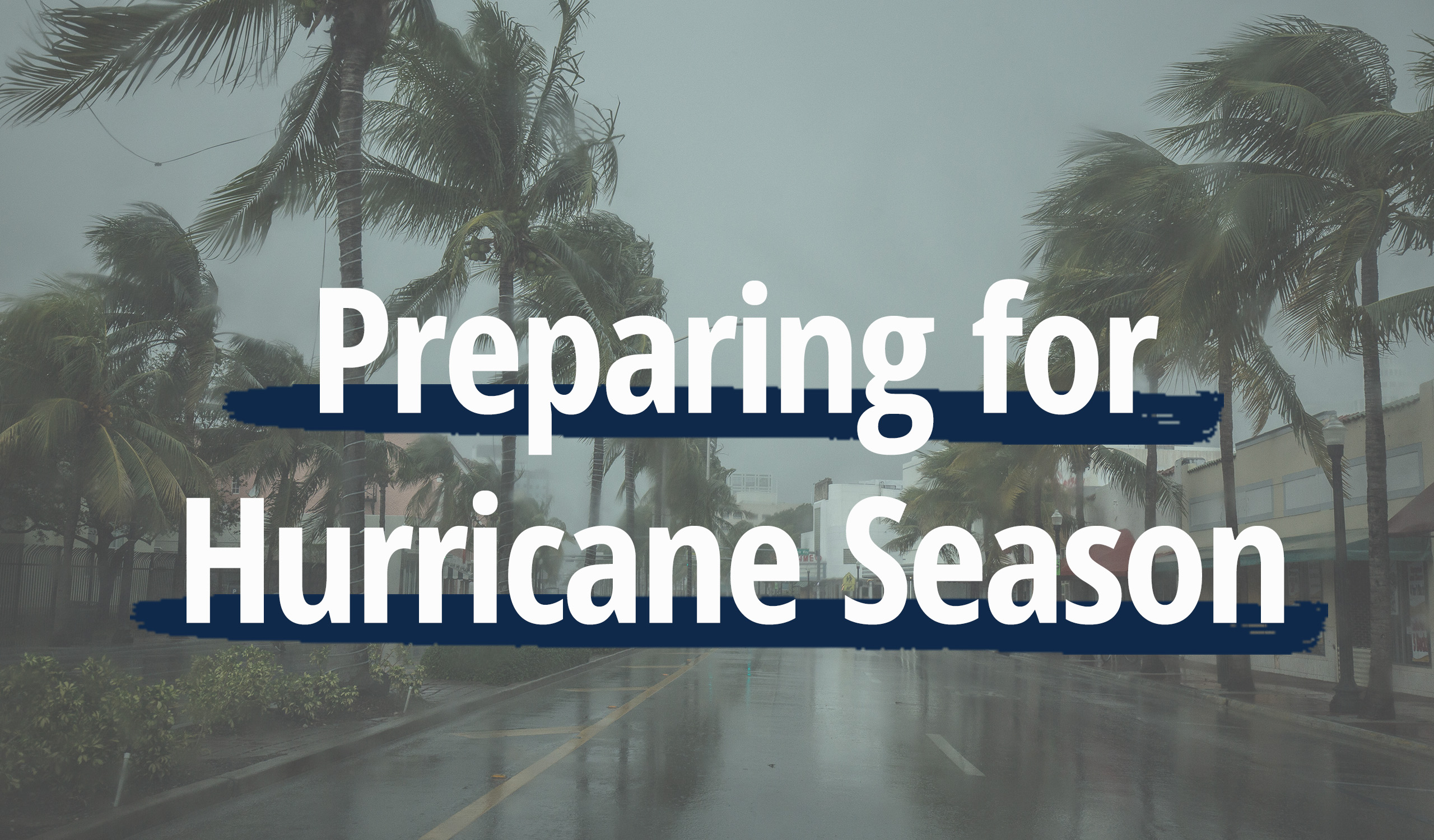May 10, 2021Preparing for Hurricane Season
The only thing worse than being in a storm is being unprepared when it strikes. Hurricanes can damage your home and property and completely uproot your life. However, you can reduce a storm’s impact on your family, home, or business by getting ready the right way. We’re here to help prepare YOU for this hurricane season.
The best time to prepare for a storm is right now. Hurricane season officially begins June 1, and lasts until November 30, but often peaks mid-August to late October. We’ve put together some tips to help you get ready.
Get to know weather-related terms. Chances are that you’ll keep track of the weather by listening to the radio while driving, watching TV, or checking your go-to online news source. If you don’t understand the weather reports, you may not know how to respond to a critical situation. Here are some weather-related terms that you should know:
- Tropical Storm: An organized system of strong thunderstorms with strong circulation and wind speeds of 39-73 mph.
- Tropical Storm Watch: Tropical storm conditions, including winds of 39-73 mph, are possible and can pose a threat to the area within 48 hours.
- Tropical Storm Warning: Tropical storm conditions are expected within 36 hours.
- Hurricane: Very strong, pronounced circulating winds of 74 mph or more and gusts up to 200 mph. Hurricanes are classified into five categories based on sustained winds and storm surges.
- Hurricane Watch: Hurricane conditions are a real possibility for the area, usually within 48 hours.
- Hurricane Warning: Hurricane conditions are expected within 36 hours.
- Evacuation order: The direction given by government officials to leave an area threatened by a storm. This direction depends on the storm’s track and projected surge.
- Storm Surge: Storm surge is an abnormal rise of water generated by a storm, over and above the predicted astronomical tides.
Plan your evacuation well in advance of a hurricane.Our home is where we are most comfortable and feel the safest, and it’s hard to just up and leave, even during hurricane. Unfortunately, many people make the mistake of assuming that they won’t have to leave their home due to inclement weather. When they finally decide leave, it may be too late.
Don’t wait to be told to evacuate if you don’t feel safe. You should plan out your evacuation route right now. Find safe locations where you’ll weather the storm if needed. This includes planning for your pets as well. Set up a communication plan and keep in mind the phone lines and internet might be out. Ensure you have each family member’s contact information written down in case your cell phone runs out of battery power. Also, if you live in a mobile home or on the coast, you’ll need to be evacuated even sooner.
Protect your home.Of course, the safety of yourself and your family are most important. But if you are evacuating, you woulddefinitely want to come back to a home that is as safe and comfortable as possible, considering the impact of a storm. Strong hurricane winds can pick up landscaping materials and hurl them through doors and windows. Not to mention, a lot of hurricane-related property damage occurs after the windstorm by rain entering your structures through broken doors, windows, and roof openings.
Don’t linger trying to safeguard your home before evacuating. Start preparing now. Though prepping your home can be costly and time-consuming, you can do it in stages throughout the year, such as the following:
- Cut weak trees and branches that could fall on your home.
- Replace rock or gravel landscaping materials with lighter, shredded bark that won’t cause as much damage.
- Protect your windows from breakage by installing storm shutters. Or you can place plywood panels over your windows by nailing them to the frames of your windows.
- Ensure your sliding glass doors are made with tempered glass and cover them with plywood or shutters during a storm.
- Hurricane-proof exterior doors and make sure they have deadbolt locks.
- Seal outdoor wall openings like outdoor electrical outlets, vents, garden hose bibs, and areas where pipes and cables go through the wall. Prevent water penetration by using high-quality urethane-based caulk.
- Replace old garage tracks and doors with a door that’s approved for both impact and wind pressure.
- If you’re living in a mobile home, be sure to secure it against high winds and check your insurance policy for coverage.
- If you own a boat that’s on a trailer, anchor the trailer securely to your home or the ground and go over your boat insurance policy.
Stock up on supplies.Whether or not you have to evacuate, there’s a chance you could be without power or water. Make sure you gather emergency supplies, such as:
- Flashlights
- Batteries
- Matches
- Battery-operated radio
- Non-perishable food
- First aid kit
- Medication
- Water
- Pet supplies
- A generator
- Portable phone chargers
Don’t forget the food and water.It’s essential to house an emergency supply of non-perishable foods that will last two weeks, even if it’s unlikely that a storm would cut off your food supply for this long. If you can’t store this quantity, store as much as you can. Consider stocking your home with these items:
- Bottled water (one gallon a day for each person or pet)
- Powdered or individually packaged drinks
- Crackers, cereals, cookies, snacks
- Canned meats, fruits, vegetables, soups, puddings
- Special dietary foods
- Peanut butter and jelly
- Powdered or shelf-stable milk
- Dried fruit
- Instant coffee and tea
- Sugar, powdered creamer, salt and pepper
- Pet food
- Baby food and formula
Since items may be more scarce than usual due to COVID-19, start stocking up on supplies now.
Be financially prepared.What if you need a hotel? Orhave to make a long-distance road trip to evacuate? A crucial part of your hurricane prep is financial prep. Here’s what you should do:
- Have an emergency fund. Put aside money to create an emergency fund for potential insurance deductibles and supplies.
- Have some extra cash on you. Most stores will only accept cash if the power goes out.
- Check your insurance coverage. Whether you’re a renter or homeowner, contact your insurance provider to make sure you’re covered adequately and that you understand exclusions. Keep in mind flood insurance coverage isn’t included in a standard homeowner’s policy and usually requires at least 30 days to take effect. Don’t forget to check your auto insurance policy for your vehicle, too.
- Keep your financial documents protected. Place these in an external safe deposit box or waterproof container. Or you can upload digital copies to a secure cloud platform.
We’re Here to Help!
While we all hope this hurricane season is mild, it’s still important to prepare. Creating an emergency fund for hurricane-related expenses is a great first step. Our staff will show you how to open a new savings account and use tools, such as direct deposit, payroll deduction, and automatic transfers, to put your savings on autopilot.
To learn more, contact us at 1-800-226-6673 or stop by one of our convenient branch locations.


